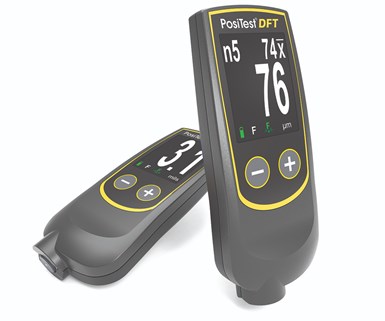DeFelsko PosiTest Offers Fast Measurements
DFT coating thickness gauge uses noncontact ultrasound technology to predict a cured thickness to help ensure adequate coverage and reduce waste.

PosiTest DFT coating thickness gage
DeFelsko’s PosiTest DFT coating thickness gauge measures coating thickness on a variety of metal substrates. The company says its features include a fast measurement speed of over 60 readings per minute, onscreen averaging for up to 99 readings, a high contrast color LCD, and an auto rotating display with lock to prevent unintended rotations. The gauge is available in two models — ferrous for measuring coatings on steel and combo for measuring coatings on all metals. DeFelsko says the unit has strong, wear-resistant, ruby-tipped probes and no calibration adjustment is required for most applications. It is designed for powder coaters, paint applicators, inspectors and more.
Related Content
-
Corrosion Resistance Testing for Powder Coating
Salt spray can be useful to help compare different pretreatment methods and coatings but it does not tell us much about the corrosion resistance of a part over time in the field. Powder coating expert Rodger Talbert offers insights into how to get a better idea of how to improve a part’s corrosion resistance in the real world.
-
NASF/AESF Foundation Research Project #121: Development of a Sustainability Metrics System and a Technical Solution Method for Sustainable Metal Finishing - 12th Quarterly Report
This NASF-AESF Foundation research project report covers the twelfth quarter of project work (January-March 2023) at Wayne State University in Detroit. In this period, our main effort concentrated on documenting technical content that was yet to be reported, including analysis of costs for specific technologies for sustainability improvement.
-
NASF/AESF Foundation Research Project #121: Development of a Sustainability Metrics System and a Technical Solution Method for Sustainable Metal Finishing - 15th Quarterly Report
This NASF-AESF Foundation research project report covers the twelfth quarter of project work (October-December 2023) at Wayne State University in Detroit. In this period, our main effort focused on the development of a set of Digital Twins (DTs) using the Physics-Informed Neural Network (PINN) technology with application on parts rinsing simulation.












